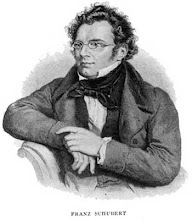
During the the early Romantic period, a composer's focus was to express feeling instrumentally, making the composition more intimate. The German lied, an art song for voice and accompaniment, quickly came into vogue because of this idea and because of Franz Schubert. Composers often unified lieder around a common theme, creating a collection of songs called a song cycle. According to Barbara Hanning, author of Concise History of Western Music, "The song cycle became especially typical of the nineteenth century, providing a balance between small and large forms, lyric and narrative content, and unity and variety, qualities strongly valued at the time" (411). Devoted to melody, Schubert's Gretchen am Spinnrade was the first leid set to text and certainly the most famous.
Gretchen am Spinnrade was set to the text of Johann Wolfgang von Goethe, a dramatist and poet. In this particular scene, a scene from Goethe's drama Faust, Gretchen is at her spinning-wheel troubled by her feelings for Faust, a man she just met and barely knows. Gretchen am Spinnrade is a strophic poem, yet Schubert rearranged the order of each strophe so that he could illustrate and extend the drama between Faust and Gretchen. He repeated the first stanza, "My peace is gone, my heart is heavy; i'll never find peace, never again," after the third and sixth stanzas and transformed it into a refrain, so that the listener is always reminded of Gretchen's inner anguish and aching heart.
Schubert's ability to convey Gretchen's madness came from his "...strong feeling for harmonic color. His complex modulations, sometimes embodying long passages in which the tonality is kept in suspense, powerfully underline the dramatic qualities of his song texts" according to Hanning (413). Schubert masterfully modulates from several different keys, each key change a symbol and exploration of feeling. This method further expressing the intent of the text and Gretchen's heart ache. The piano accompaniment is intended to enforce the meaning and setting of the song but never to over shadow the voice. In Gretchen am Spinnrade, the melody line of the piano part emulates the spinning of the wheel, the cycle of Gretchen's thoughts, and the intensity of her feelings.
Franz Schubert composed six hundred lieder in his time. J. Peter Burkholder and Claude V. Palisca write that Schubert's lieder were often performed in intimate and informal gatherings called "Schubertiads" (NAWM 307). These song types were intended for amateurs to perform in their homes among friends. Lieder later became staples in voice recitals developing in to the story telling, folk singing we use in popular music today.

No comments:
Post a Comment